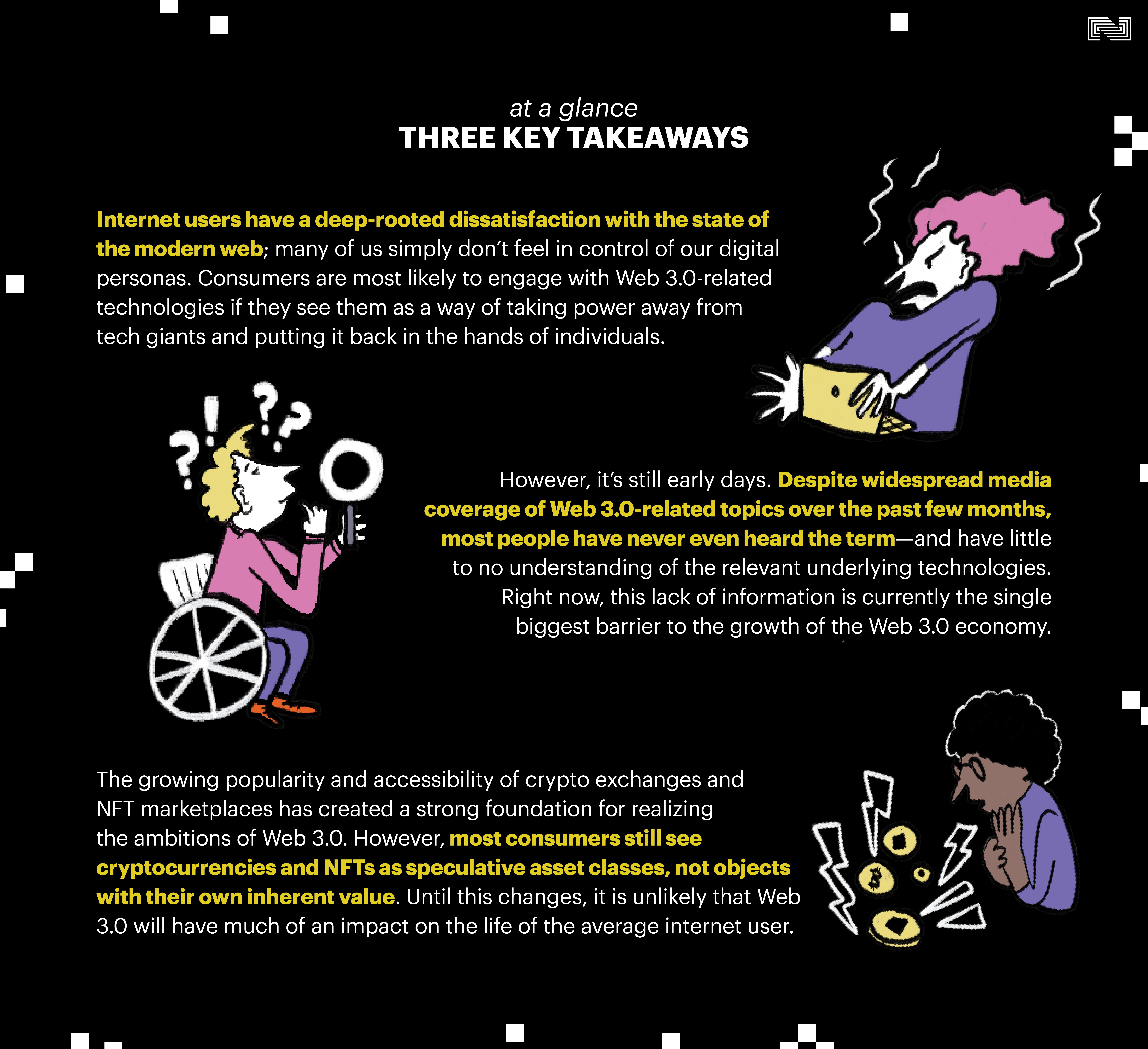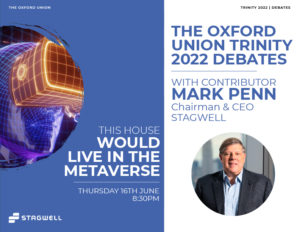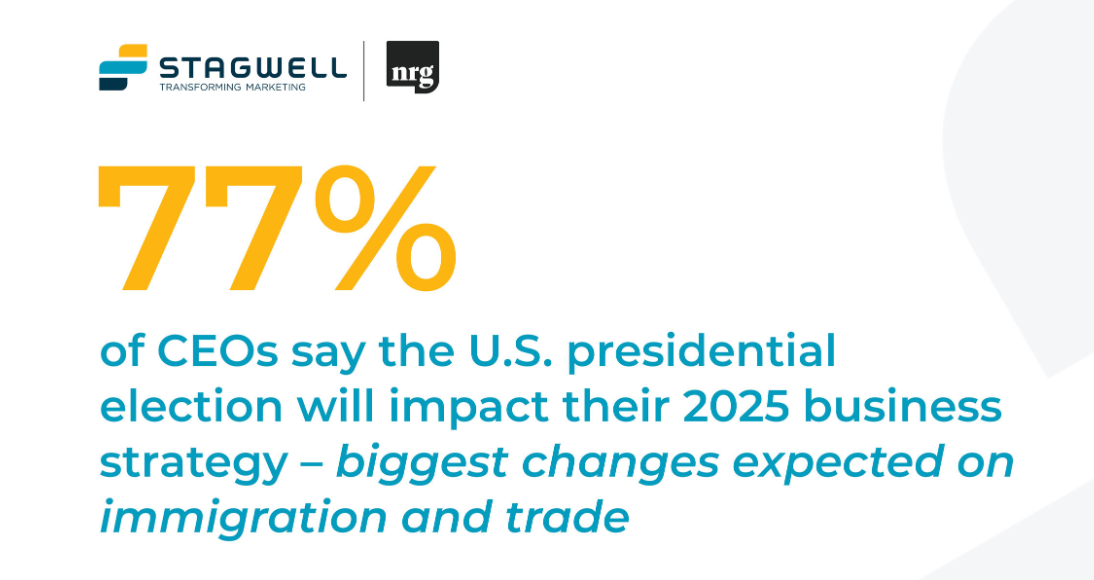Welcome back to Hitting the Mark, my monthly analysis of developments at the intersection of business, marketing, and politics for modern C-Suite leaders. This month, I look at the metaverse in terms of how it can transform brands – and how it may transform society.
Before we vault to the future, I want to acknowledge the turmoil that the overturning of Roe v. Wade has caused. As predicted in last month’s column, this summer is “chock-full of potentially divisive issues for corporations.” At Stagwell, we moved immediately to provide a travel benefit that ensures all employees maintain access to reproductive healthcare. I worked for Planned Parenthood of New York as their consultant for 10 years in the late ’70s and ’80s when this legal battle was new – and feel strongly about protecting choice.
As you consider how to navigate this issue, our Harvard CAPS/Harris data shows that while most people would have supported continuing Roe, a majority would also have supported rollbacks to the viability standard as proposed by Justice Roberts, and large majorities oppose late-term abortions. The July edition of the Harvard CAPS/Harris Poll – released today – continues to track American sentiment post-Roe. If you’d like to connect for advice on how to navigate this landscape, please reach out.
Turning to the topic of this month’s newsletter, the metaverse. Today’s business leaders are faced with two major discussion tracks around the metaverse: how will it transform my brand? And how will it transform society?
The Metaverse and Brands
On the first: I had the pleasure earlier this June of giving a fierce argument on behalf of the future of the metaverse at the prestigious Oxford Union, alongside technologists, academics, journalists, and brand leaders seeking to determine whether “this house should live in the metaverse.” Spoiler alert: we lost the debate. But I got some interesting insights from the audience – mostly younger, Gen Z consumers. The reasons why we lost prove there’s much for marketers to dig in on as they drum up consumer excitement about the metaverse, map its contours, and start innovating their technologies, products, and services.
Younger consumers are cynical almost to the point of anger about Big Tech and FAANG dominating the metaverse. I heard impassioned speeches from the opposition about the various ailments Web2 platforms have unleashed on the world, from broken freedom of speech to harassment, to the consolidation of power, and more. And that tracks with recent research from National Research Group showing consumers think the Internet has become more commercialized (80%), addictive (79%), and has encouraged people to treat each other more cruelly (69%).
- My take: Big tech beware: if you look at the arc of innovation, tech empires have limited lifespans. Myspace fell to Facebook. YouTube is losing ground to TikTok. Facebook’s social empire based on the sale of user data is shrinking. In the metaverse, I believe Big Tech will certainly be part of the equation, but the hardware, servers, and aspects of the tools needed to build dominant visions of the metaverse and Web3 may push many new worlds and businesses into the market

These Oxfordians challenge the idea you can live a fulfilling life in the metaverse, even as they see the potential for it to scale and democratize access to global travel, quality education, and shared experiences. Blame it on the propensity of the young to see apocalypses lurking behind every corner or on the lingering psycho-social effects of the pandemic, but younger consumers are worried metaverse tech will open Pandora’s Box into a social dystopia where consumers live more in virtual reality than real life.
- My Take: What they ignore – and where brands have an opening to bridge this gap – is the sheer volume of time we already spend in digital and virtual realities. A reliance on digital existence is already a norm and could intensify, given more engaging and immersive metaverse worlds. This may actually lead to a more positive state of mental health in comparison to current screen time practices.
Oxford listeners are just as confused about the terminology as brand marketers (but that doesn’t matter). Metaverse? Web3? Blockchain? Younger consumers are just as baffled by the buzzwords as senior brand marketers. But they’re not invested in the halo excitement around this fresh new tech – and unimpressed with many of the early metaverse experiments which don’t model the true potential of Web3.
- My Take: The most helpful definition brands can work with is, the metaverse is not a single application, or program, or virtual reality – it’s, as Wired points out, a multiverse of metaverses. Like streaming services, there are many, constantly competing with other groups, constantly breaking into new content niches. While it may benefit technologists and investors to think of the metaverse in the context of cryptocurrency of NFTs, there is no necessary connection between the multiverse of metaverse and those terms. They are only part of the tech-bro world, along with unrelated ideologies. Your best bet as a brand playing in the metaverse over the next year? Think about it in the context of the experiences it can create, more so than the technology that needs to be built to reach its most perfect vision
The Metaverse and Society
Beyond pure brand applications, the metaverse promises to transform society for the better. There are four immediate Metaverse applications that illustrate the power of this technology – and why we’re bullish on ensuring it comes to life. The below is an excerpt from my speech at the Oxford Union.
Metaverse One: Avatar interviewing can massively increase women’s’ success in the job market.
Should we wait decades for attitudes to change or hope that implicit bias training will someday produce effective and lasting results? No. You are likely aware of the practice of blind auditions to select members of symphony orchestras.
In the past, candidates would perform before a selection committee on stage, where the gender of candidates was obvious. To combat likely gender bias, most American symphonies now conduct auditions with the performer behind a screen — only their music matters. The Guardian reported that the use of screens increases the odds that a woman will advance from preliminary rounds to finals by 50%! The percentage of women in American symphony orchestras has risen from 5% to nearly 30% in the period after screens were adopted.
Imagine if job interviews were gender-neutral. Interviewers would meet with identical avatars distinguished only by their answers to interview questions and the questions that prospective employers ask. The metaverse could create a level playing field in hiring unimaginable in today’s world. Millions of women are waiting for the metaverse to advance their careers.
Metaverse Two: The opportunity afforded by debate can reach thousands more. The Yale University high school tournament ordinarily brings 300 teams to its most heavily attended division of debate. In the Fall of 2020, 900 teams participated – three times as many when costs are reduced to a cell connection and a 4G cellphone, accessible to anyone for a small fraction of the cost of physical tournament attendance. Remarkably, by eliminating the expense of air travel, hotel stays, and local transportation, these efforts have significantly improved access for thousands of students. Are these events as moving, as satisfying, as physical attendance? Perhaps not, depending on how much you loathe the hassle, expense, and friction of travel, a virtual tournament has many advantages.
But, with a multiverse of 3D speakers, who can go to rounds, wander a virtual campus, gather at virtual cafes to discuss the resolution and complain about teammates and judges, the experience can be made both more satisfying and really, really cheap. By making debate more accessible to students everywhere the many lifelong advantages of this activity can reach hundreds of thousands of students who are denied access by the accidents of geography and economic status.
Metaverse Three: The metaverse can produce an explosion of educational opportunity. Zoom was a very taxing first step in distance learning. Let’s be clear: hours on a Zoom lecture can be mind-crippling. This explains the failure of Massive Open Online Classrooms – MOOCS – that enroll many and graduate almost no one because they are primarily cameras in lecture halls.
But the Metaverse is not your father’s Zoom technology. Within a metaverse environment with classmates around a table, with course materials available at a click to all within a classroom, everything can change. No one disputes that an immersive, high-resolution environment is greatly more engaging than Zoom. If a professor wants you to study the Great Pyramids at Giza, you can go there in photoreal environments. You can tour the tombs of Cheops and Tutankhamun in real time. You can examine exhibits at the Louvre without pushing through crowds of tourists. Lab experiments can be performed before your very eyes. It is true that a picture is worth a thousand words – but a lived experience is worth a thousand pictures.
Metaverse Four: Medical miracles. For example, the BBC tells the story of one British woman who recounted her joyous experience of visiting new worlds and environments after being left severely disabled by a traumatic brain injury. These interventions—priced only at the rapidly decreasing cost of a VR headset—have the potential to bring people immense benefits, ranging from stress relief, anxiety treatment, and amelioration of chronic pain.
Furthermore, such technology will dramatically improve surgical training, saving lives and limbs. One study finds that surgical trainees using VR learned a procedure nearly seven times faster than their traditionally trained counterparts; the technology helps to always keep surgeons’ focus on their patients rather than on external displays. Additionally, consulting doctors in virtual reality for minor ailments can help reduce strain on the already-overwhelmed medical industry.
We’ll be inventing and reinventing the metaverse for years, if not decades, to come. To make the metaverse perform for consumers (not just for those of us geeking out about the technology) brands are going to need to keep their ears to the ground with polling, surveys, and data analysis to track where consumers see the metaverse adding value – and where they’re just confused about why brands are serving virtual hot dogs.
Until next time,
Mark Penn
Related
Articles
In the News, Press Releases
Jan 08, 2025
SPORT BEACH is Back: Stagwell’s (STGW) Activation to Return and Expand in 2025

Events, In the News, Investments & Financials, Press Releases
Jan 07, 2025
Stagwell (STGW) to Participate in the 27th Annual Needham Growth Conference

In the News, Press Releases
Jan 07, 2025
Ad Results Media Forms Strategic Partnership with Stagwell’s Brand Performance Network, Bolstering Global Network’s Audio Advantages

Newsletter
Sign Up
Originally released on

NEW YORK and OXFORD, England – June 7, 2022 – Stagwell (Nasdaq: STGW), the challenger network built to transform marketing, today announced Chairman and CEO Mark Penn will join The Oxford Union, the world’s most prestigious debating society, to debate the promises and pitfalls of the metaverse. The debate, “This House Would Live in the Metaverse,” will explore the future of Web3 and the metaverse in the context of data and privacy, brand marketing, and ultimately, how the metaverse will transform the way people, countries, and communities connect. Stagwell invites press to attend the debate at 8:30 p.m. GMT+1 on Thursday, June 16; details to RSVP are below.
Penn will argue on behalf of the metaverse as a platform that can transform how brands relate – and market – to consumers. Stagwell is excited about the potential of Web3 and currently counsels multinational brands on whether and how to enter the metaverse, including areas of investment to consider within augmented reality (AR), non-fungible tokens (NFTs), the creator economy, and other areas of opportunity.
“We’ve only just scratched the surface of AR, VR, NFTs and other emerging technologies in the metaverse, and I’m excited to join this expert group as we debate the possibilities,” said Stagwell Chairman and CEO Mark Penn. “The metaverse provides an entirely new canvas for brands to build creative, digital experiences that connect consumers around the world.”
Current confirmed debaters include:
Proposition Side
- Stagwell Chairman and CEO Mark Penn
- AGT International Chairman & Owner Mati Kochavi
Opposition Side
- University of Birmingham Professor Sylvie Delacroix
- Bloomberg and Techworld journalist Margi Murphy
- TechCrunch Editor-at-Large Mike Butcher
Journalists interested in attending the debate and/or connecting with Penn for an interview, please contact Beth Sidhu at beth.sidhu@stagwellglobal.com.
About Stagwell Inc.
Stagwell is the challenger network built to transform marketing. We deliver scaled creative performance for the world’s most ambitious brands, connecting culture-moving creativity with leading-edge technology to harmonize the art and science of marketing. Led by entrepreneurs, our 10,000+ specialists in 34+ countries are unified under a single purpose: to drive effectiveness and improve business results for their clients. Join us at www.stagwellglobal.com.
About The Oxford Union
Founded in 1823, the Oxford Union is a forward-thinking institution at Oxford University that strives to strengthen democratic values through free and fair discussion. Having invited illustrious guests from the Dalai Lama to Presidents Carter, Nixon, and Reagan, the Oxford Union allows its members to debate and question the modern thinkers of our time. Diversity, not only of opinion or politics but of all types, remains the lifeblood of the Union today, and continues to be so for as long as we are visited by the greatest and most knowledgeable speakers in the world.
Contact: Beth Sidhu
beth.sidhu@stagwellglobal.com
+1. 202.423.4414
Related
Articles
In the News, Press Releases, Thought Leadership
Oct 30, 2024
77% of CEOs Say the Election Will Impact their 2025 Business Strategy; 85% are Bullish on Investment in the Gulf Region, Reveals Stagwell (STGW) Survey

In the News, Press Releases, Talent & Awards
Sep 18, 2024
Stagwell (STGW) Appoints Sunil John as Senior Advisor, MENA, to Spearhead Regional Growth
Marketing Frontiers, Thought Leadership
Jul 26, 2024
Game On for In-Game Advertising? Four Things Marketers Should Know About Gaming
It's clear from dozens of Stagwell’s interviews with senior marketers…
Newsletter
Sign Up
CONTACT
hello@stagwellglobal.com
SIGN UP FOR OUR INSIGHTS BLASTS
By Josh Beatty, Founder, ARound
Early reactions to Miller Lite’s “Meta Lite Bar” experience – where it will offer virtual beer, games, and a chance to view what would have been its Big Game spot –prove there’s work needed to convince the masses that the Metaverse matters. Steve Colbert ripped into the idea: “Man, I love commercials, but I wish I had to work harder to access them while my avatar drinks this imaginary can of carbonated disappointment.”
While some of his riff is just late-night chum, there are insights about how brands should approach the Metaverse, mixed-reality, and emerging tech that consumers are just beginning to identify and understand. Colbert’s points are top of mind for everyone as big ideas for virtual storefronts, fully immersive VR experiences, and digital avatar ecosystems fill the news.
Two parts of Colbert’s criticism for brands to unravel:
- “Work harder to access” – This is going to be a big barrier to early adoption of Metaverse tech. If consumers don’t find it easy to access brand experiences, they won’t engage. While conditioned consumer behavior is the hardest thing in the world to change (when did you last download an app for something?), the only thing stronger than conditioned behavior is a change to one’s environment. Experiments in AR and mixed-reality, especially powered by mobile, can disrupt and captivate consumers in a memorable and meaningful way. Shared environments with low barriers to access will drive value in this space.
- “While my avatar drinks this imaginary can of carbonated disappointment.” The Metaverse is a shared experience, but virtual reality can be isolating. AR and other tech that allows for shared social experiences will connect us to people and places in exciting and fun ways. While the idea of drinking a digital beer may leave people scratching their heads, if the metaverse dive bar that Miller Lite unveils during the Big Game includes a compelling array of shared content and experiences, the fun consumers are having together in this space will eclipse their initial confusion at the premise.
Many brands will try their hands at Metaversal tech in the coming months. Marketers should learn from early consumer/social reactions to experiments underway at the Big Game and proactively work to solve some of the barriers of consumer adoption in this exciting new space.
Related
Articles
In the News, Press Releases, Thought Leadership
Oct 30, 2024
77% of CEOs Say the Election Will Impact their 2025 Business Strategy; 85% are Bullish on Investment in the Gulf Region, Reveals Stagwell (STGW) Survey

Marketing Frontiers, Thought Leadership
Jul 26, 2024
Game On for In-Game Advertising? Four Things Marketers Should Know About Gaming
It's clear from dozens of Stagwell’s interviews with senior marketers…
Thought Leadership
Jun 28, 2024
Hitting the Mark: Future of News Takeaways from Cannes Lions
Stagwell brought the Future of News to Cannes Lions, where…
